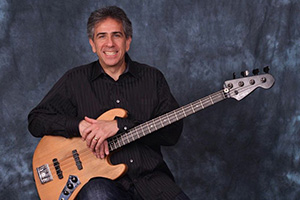Some obvious – and not so obvious – things to try
By Jon Liebman
Week of January 27, 2020
For someone who wants to become a better bass player, it never hurts to be reminded of the things we all know we should be paying attention to.
The topic came up in this week’s interview with longtime Elvis Costello bassist Davey Faragher. It was so much fun talking to Davey, hearing him tell stories about growing up as one of 8 siblings, playing in bands with his older brothers, and how he was heavily influenced by Duck Dunn and the R&B bass players. The interview also includes Davey’s must-read recounting of playing with David Crosby!
I asked Davey about what he thought was important for someone who wants to be a good bass player. After all, the guy’s been playing, writing and recording music practically all his life. I thought I’d pass along some of his words of wisdom. Any aspiring bass player would do well to heed this advice.
I’m sure Davey could have gone deeper, had the conversation been longer, but here are six things that immediately came to mind:
1. Listen. I mean really listen to the music. How would you know how to play if you didn’t know what the music is supposed to sound like? Naturally, you’ll want to hone in on the bass, but make sure you also make note of how the bass fits in to the overall sound. Growing up in a musical household with older brothers who were really into all the popular music of the day (by “the day,” I mean ‘50s and ‘60s rock & roll), Davey recalls his brothers’ collections of “hundreds and hundreds of 45s” that were constantly playing. Davey just ate that stuff up!
2. Emulate. Once you understand how the music should sound, the next step is to try to imitate what you hear. “One door leads to the next door,” Davey says. “You start out by listening to a record and then trying to figure it out.” I recommend playing along with the record and seeing if your groove feels right. Then try recording yourself practicing, and, if you’re brave enough, listening back to compare how closely your playing matches up with the music you’re trying to learn. Repeat the process, making any necessary changes, large and small. Your progress will surprise you!
3. Pay attention to your tone. Playing the music in time, grooving with a good feel, getting the technical aspects right, etc., are all important things. But don’t overlook the tone of your bass. Different styles and genres have different sounds that are expected of the bass player. You don’t want to use the same tone for playing James Jamerson, Bootsy Collins, Jaco Pastorius, and Chris Squire lines. Be sure to do your homework in this department so you can stay true and authentic to whatever style you’re playing.
4. Don’t overlook the fundamentals. After you’ve been playing bass for a while, even if it’s only a little while, you’ll start to develop habits. Make sure they’re good habits. Even something as basic as the way you press your fingers down on the fingerboard can easily be overlooked. “It sounds so obvious, but people kind of skip over that part,” says Davey. What other fundamentals might you be skating over? Sometimes it’s good to take a step back and analyze the way you’re doing certain things. Not everything is “a given” when it comes to bass technique. Make sure your hand positions, attack, note length, etc., are getting the job done. Revise as needed.
5. Slow down. We all have a tendency to want to play fast. Before doing so, make sure you’ve got the notes under your fingers. I know it sounds obvious, but ask yourself if you’ve ever been guilty of trying to play something faster than you’re able. Remember, if you can’t play it slowly, you surely can’t play it fast. (FBPO members: The rhythm variations exercises in my online lessons will be a big help here.)
6. Pay attention to the phrasing. Once you get the notes under your fingers, the ultimate goal needs to sound like you’re making music, not pushing buttons. “It is about learning the lick,” Davey says, “but it’s also about playing it like you’re singing it.” This is great advice! I’ve had teachers that told me to sing along with my playing – I even had one teacher who had me sing without playing! The difference in phrasing, articulation and overall musicality was incredible.
Of course, these are not the only – or even necessarily the most important – things to keep in mind, but if you concentrate on these 6 items, you’re sure to be on your way to becoming a better bass player.
Have a thought on the subject? Leave a comment below and let me know what you think. In the meantime, check out my interview with Davey here.





